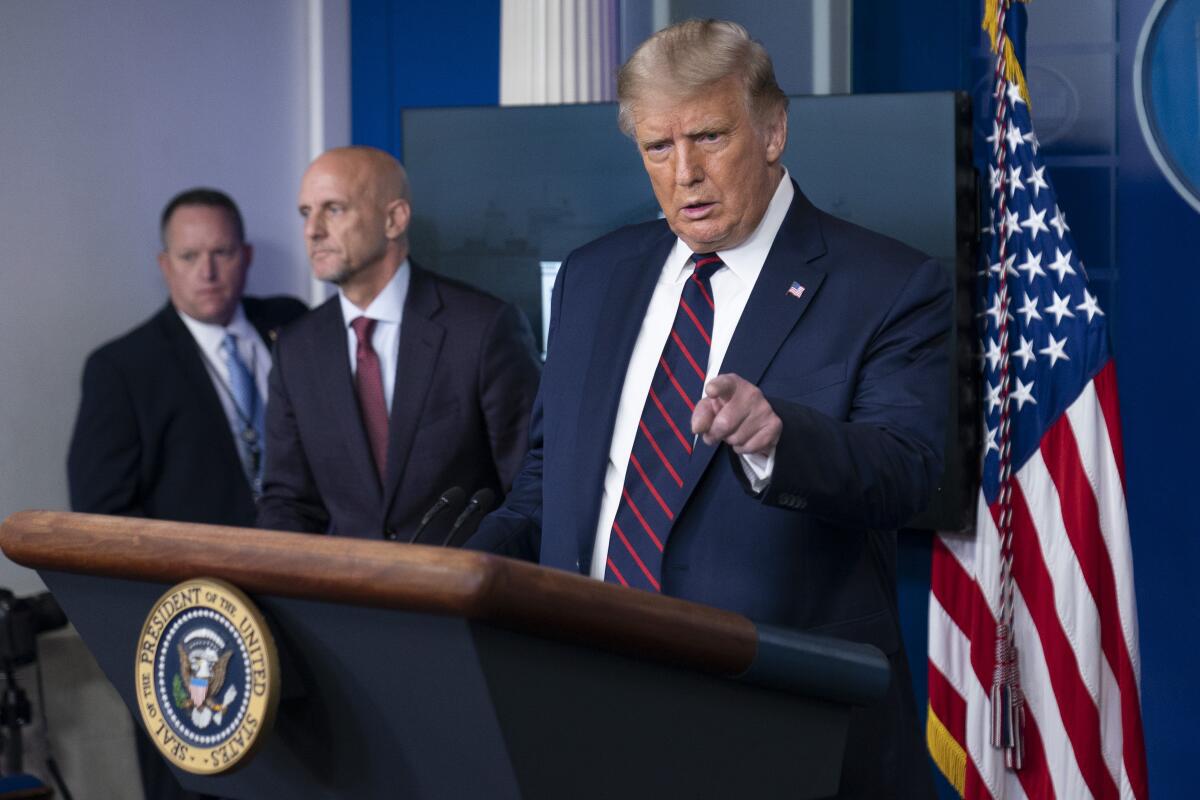Trump touts ‘breakthrough’ coronavirus treatment as some experts express skepticism

- Share via
WASHINGTON — On the eve of the start of the Republican National Convention, President Trump on Sunday touted a “very historic breakthrough” in treating coronavirus, announcing that the government had authorized the emergency use of blood plasma from recovered COVID-19 patients to combat the disease.
But scientists said the therapeutic benefits of the treatment, which has already been used on some 70,000 patients, were not yet fully understood, and some public health experts questioned whether political considerations had colored the decision-making process.
It was not the first time Trump had hailed what he described as a game-changer in treating the virus, which has killed more than 175,000 Americans. And it echoed a previous pattern of the president overriding or undermining his government’s own scientists in confronting the 6-month-old outbreak, which has devastated the U.S. economy and upended daily life across the nation.
In an appearance at the White House, Trump, whose pandemic policies have come under scathing attack from Democrats, claimed credit for personally prodding what he depicted as a reluctant federal bureaucracy into action with the Food and Drug Administration’s emergency order.
“That’s such a powerful term, emergency use,” he said. “Today’s action will dramatically expand access to this treatment. ... The results have been incredible.”
“We’re not going to let it be held up,” he added.
Trump’s Health and Human Services secretary, Alex Azar, appearing alongside him, hailed it as a “major advance in the treatment of patients.” Food and Drug Administration Commissioner Stephen Hahn cited the “totality of data” as backing the use of convalescent plasma as safe.
The White House had contended for days that the FDA was dragging its feet on approving lifesaving therapeutics — a contention sharply disputed by Scott Gottlieb, a former head of the FDA under Trump.
“I firmly reject the idea that they [the FDA] would slow-walk anything or accelerate anything for that matter, based on any kind of political consideration and any consideration other than what’s best for the public health,” Gottlieb said on CBS’ “Face the Nation.”
The president’s announcement came against the backdrop of public opinion polls that suggest about two-thirds of Americans do not approve of his handling of the pandemic, which has hit the United States harder than any other advanced country.
At last week’s Democratic convention, Trump’s pandemic policies were excoriated, and the outbreak’s grim course is expected to be a central campaign talking point by the Democrats’ nominee, former Vice President Joe Biden. Trump this week will formally accept the Republican presidential nomination.
The president — who has often sought to deflect the blame for failures in fighting the virus, which has killed more than 176,000 Americans — suggested in a tweet late Saturday that a shadowy “deep state” was trying to harm his reelection prospects.
That, he implied, might be preventing the FDA from moving ahead swiftly with regulatory approval of treatments for COVID-19, the disease caused by the virus. “Must focus on speed, and saving lives!” he wrote.
In earlier appearances on Sunday’s news-talk shows, Trump’s chief of staff, Mark Meadows, provided no evidence to back up the president’s claim of a deliberate slowdown in approving coronavirus therapeutics, blaming “bureaucrats who think that they can just do this the way they normally do it.”
“The president’s right to call it out,” he said on CNN’s “State of the Union.”
In a separate appearance on ABC’s “This Week,” Meadows suggested that Hahn‘s job might have been in jeopardy.
“It’s almost impossible to fire a federal employee, regardless of what they do wrong,” he said.
Telegraphing Sunday’s announcement in advance, Trump last week blasted the FDA for a decision against authorizing convalescent plasma’s emergency use after the National Institutes of Health cited relatively scant data.
In announcing the emergency use authorization — which is different than FDA approval — the chief scientist for the FDA, Denise Hinton, wrote that “convalescent plasma should not be considered a new standard of care for the treatment of patients with COVID-19.” She added that “additional data will be forthcoming from other analyses and ongoing, well-controlled clinical trials in the coming months.”
Other scientists questioned Trump’s role in promoting the treatment. Benjamin Corb, public affairs director of the American Society for Biochemistry and Molecular Biology, said Trump was “once again putting his political goals ahead of the health and well-being of the American public.”
“The FDA last week held up on issuing this authorization at the behest of government scientists who are awaiting clinical trials to prove the safety and efficacy of the treatment,” he said in a statement.
In the CBS interview, Gottlieb described convalescent plasma as having “incremental” known value.
“I believe plasma is probably beneficial,” he said. “But I think some people wanted to see more rigorous data to ground that decision. And I think that’s part of what is going on here with respect to that tweet, and questions about the FDA decision-making.”
Trump’s move fueled existing concerns about politics, not science, taking a lead role in White House coronavirus policy. Andrew Slavitt, who was a senior healthcare official in the Obama administration, tweeted before the announcement that convalescent plasma, if given early enough in the course of the disease, did appear to result in a lowered death rate.
Slavitt, who served as acting administrator for the Centers for Medicare and Medicaid Services, said officials and scientists he had spoken to still had many questions and concerns about the data to date.
In the course of the pandemic, Trump has often publicly undercut senior scientists, including Dr. Anthony Fauci, the government’s top infectious-disease expert.
The president has denigrated mask-wearing, which is urged by virtually all public health professionals, and touted the use of hydroxychloroquine, an anti-malarial drug indicated in controlled clinical trials to offer no benefit in treating COVID-19.
Trump also attracted widespread ridicule earlier this year when he mused that ingesting disinfectant might be a treatment worth studying. Poison hotlines and a number of public officials then took to the airwaves and social media to implore people not to drink bleach.
In the late spring and early summer, Trump also pushed governors to reopen their states whether or not they had achieved containment benchmarks set by his own administration. In several big Sunbelt states, including Texas and Florida, that policy was blamed for igniting some of the most serious outbreaks to date, which are now subsiding but shifting to other parts of the country.
New daily cases have dropped below 50,000 for more than a week, and deaths, which stayed around 1,000 a day for the last four weeks, are probably about to drop below that level.
“The concern is that if there is sort of a third wave, a third iteration of the national epidemic, it could be more diffuse, spread across a broader section of the Midwest and the West, because cases are building in those parts of the country,” Gottlieb said. “And that’s what’s concerning people right now.”
More to Read
Get the L.A. Times Politics newsletter
Deeply reported insights into legislation, politics and policy from Sacramento, Washington and beyond. In your inbox three times per week.
You may occasionally receive promotional content from the Los Angeles Times.










